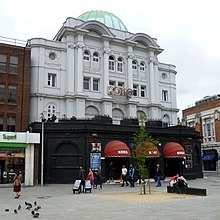KOKO (music venue)

KOKO
|
|
| Former names |
|
|---|---|
| Location |
Camden Town London, NW1 United Kingdom |
| Coordinates | 51°32′05″N 0°08′18″W / 51.534722°N 0.138333°W |
| Public transit |
|
| Owner | The Mint Group |
| Designation | Grade II listed |
| Type | Music venue |
| Capacity | 2,434 seated on 4 levels (1901) 1,410 (2008) |
| Current use | Music venue |
| Construction | |
| Rebuilt | Refurbished: 2004 |
| Architect | W. G. R. Sprague |
| Website | |
| www |
|
KOKO (previously called The Music Machine and Camden Palace) is a concert venue and former theatre in Camden Town, London. The building was known as Camden Palace from 1982 until its 2004 purchase and extensive restoration led by Oliver Bengough and Mint Entertainment. Since, the club has been known as KOKO and serves as one of the premier live music venues in London.
The Camden Theatre opened on Boxing Day 1900. With a capacity of 2,434 it was one of the largest theatres in London outside the West End. The theatre was designed by the prolific theatre architect W. G. R. Sprague. The theatre was opened by Ellen Terry, then the most celebrated actress in England, who had lived in nearby Stanhope Street as a child.
The St Pancras Gazette, a local newspaper, commented as follows in a review of the theatre's production of an opera called The Geisha in 1901:
On 6 December 1909 it reopened as a variety theatre and became the Camden Hippodrome Theatre. By 1911 films were being presented as part of the programme and in January 1913 it became a cinema known as the Camden Hippodrome Picture Theatre. In January 1928, the theater was taken over by the Gaumont British cinema circuit.
Closed during World War II, it outlived many similar buildings, including Camden Town's other theatre, the Bedford Theatre, largely because it became a BBC radio theatre from 1945 and is Grade II architecturally listed since 1972. Among the first weekly series to be broadcast live from here were The Richard Tauber Programme [1945–47]. Later programmes recorded at the theatre included The Goon Show and Monty Python's Flying Circus album (2 May 1970) until the BBC moved to the Golders Green Hippodrome in 1972.
...
Wikipedia
